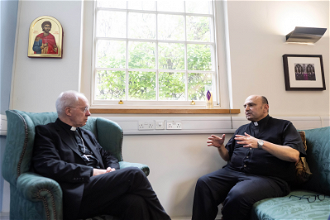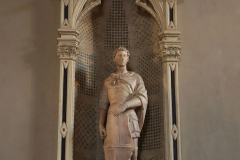EU Bishops call for long term political vision to deal with financial crisis

COMECE Bishops have called on the European Union and its citizens to refrain from blaming one another, and instead assume co-responsibility for finding solutions to the current financial crisis. They also call on European leaders to adopt a long-term perspective to overcome the crisis. These were the main messages of the Autumn Plenary Assembly of COMECE, which took place on 26 to 28 October 2011 in Brussels and was dedicated to "the Financial crisis and future of European integration".
The Bishops heard several specialists on this complex issue. Mr Peter Wagner, from the European Commission, presented the mission of the newly created Task Force for Greece. Prof Dr Lans Bovenberg, Tilburg University, Dr Emmanuel van der Mensbrugghe, Director of the IMF Office in Europe and M. Jean-Pierre Jouyet, President of the French Financial Markets Authority presented their view on the economic and political causes of the debt crisis in Europe.
The causes of the crisis are structural and they are mainly rooted in short-term and very often electorally motivated political choices over recent decades. These choices often reflect individual behaviour of credit-financed consumerism. In the current situation, a culture of blame will lead nowhere. Europeans should stay united and exercise solidarity in order to overcome the present crisis. Crisis doesn't necessarily mean decline: it can be made an opportunity for renewal.
The President of the European Council, Herman Van Rompuy, presented to the COMECE Bishops the outcome of the European Summit, which began on 26 October. The Bishops welcomed this result, as a response to the immediate crisis. Knowing, however, that technical and short-term solutions will be insufficient, they underlined the need for developing a long term vision concerning the European Institutions and the social and economic model they promote. The interests of the younger generation in particular, who risks being the major victims of the crisis, need to be better taken into account.
The Bishops are convinced that the Church can be a force for cohesion and hope within European societies, which are threatened by populism and division. The main roots of the present Crisis are moral and spiritual. Moral relativism is changing the sense of personal and collective responsibility and the sense of the common good in the long perspective. Through their social services, Churches help the weakest in our societies; they promote human dignity and the common good against individualistic tendencies.
COMECE Bishops also adopted a declaration on Social Market Economy, a term which has been inserted into the Treaty of the European Union with the Lisbon Treaty. The text, "A European Community of Solidarity and Responsibility", will be published in several languages in early January 2012.
Source: COMECE




















